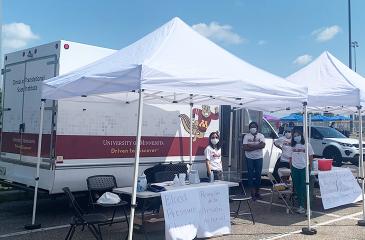The University’s Mobile Health Initiative recently partnered with community-based organizations in southern Minnesota to provide health care services and COVID vaccinations for migrant agricultural workers and their families.
In partnership with the Tri-Valley Opportunity Council, the Mobile Health Initiative’s volunteers of health professionals and health sciences students provided health education and screening, medication refills, dental treatments including fluoride and silver diamine fluoride varnishes for adults and children, COVID vaccinations, and vision screening. Working with the Latino Medical Students Association, Shahid Jaffer, MD, and Johnna Hobbs, OD, the group was able to provide access to deeply discounted prescription eyewear for $5 for dozens of people.
“A great impact of these events is being able to connect people with the care they need when they need it,” said Jonathan Kirsch, MD, who leads the Mobile Health Initiative. “For example, a 16 year old who attended one of our July events couldn’t afford her own glasses, so she had been wearing her father’s glasses that unfortunately were not right for her. She had stopped reading and was having other vision-related issues. We were able to connect her with appropriate care through our vision screening exam and were able to provide the right glasses she needed. She was extremely grateful.”
These health fairs for migrant agricultural workers are part of the University’s longstanding partnerships with various state rural organizations to provide services to the thousands of migrant farmworkers who travel to Minnesota every summer to contribute to the state’s agricultural workforce.
“Migrant farmworkers face a number of health inequities due to pesticide exposure, poor housing, low health literacy, lack of transportation and language barriers that often prevent them from seeking care until they face significant health complications,” said Kirsch. “One of our goals of the Mobile Health Initiative is to provide culturally-aware, interprofessional preventative care, including immunizations, to this unique population forming the backbone of our agricultural economy,” said Kirsch.



